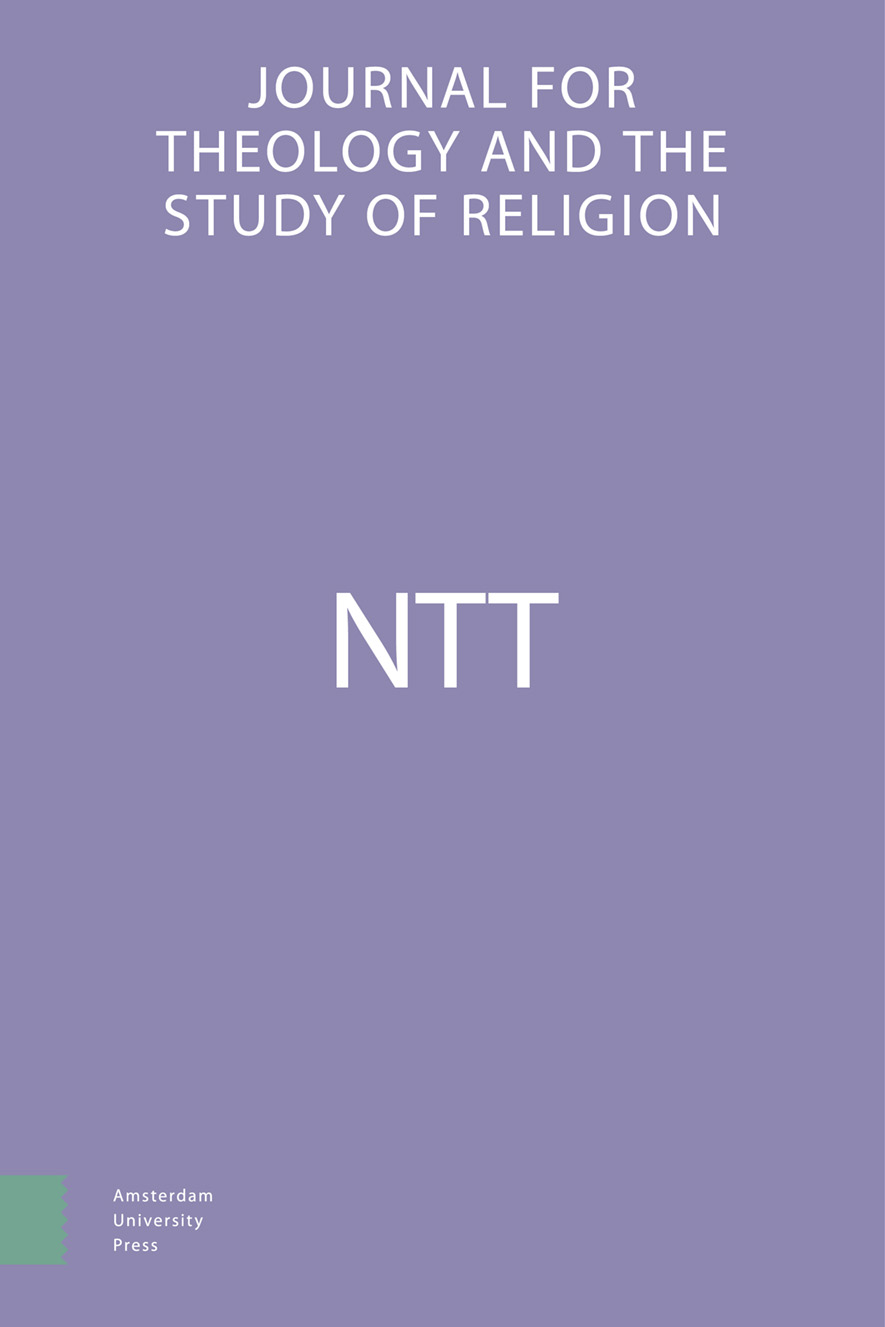- Home
- A-Z Publications
- NTT Journal for Theology and the Study of Religion
- Previous Issues
- Volume 62, Issue 4, 2008
NTT Journal for Theology and the Study of Religion - Volume 62, Issue 4, 2008
Volume 62, Issue 4, 2008
-
-
Collective Memory and Group Formation. Paul’s Methods of Christological Conflict Control
More LessAuthor: Jürgen K. ZangenbergBeing a necessary element of group formation, conflicts between competing positions stand at the cradle of Christianity. Identities take form through pointing out differences and defending them. But group conflicts need to be limited and balanced out in order to keep their creative impetus and not turn destructive. Inspired by Kees Schuyt’s 2007 Cleveringa Lecture, the article discusses how Paul tried to regulate group conflicts in his communities. It quickly becomes evident how frequently and skillfully Paul takes recourse to fundamental theological traditions and formative practices and experiences common to him and his addressees. Christology and Paul’s role as apostle play a particularly important part. But not always Paul seems to have succeeded.
-
-
-
[De dynamiek van het christelijk-joods conflict 50-150 AD, The Dynamics of the Christian-Jewish Conflict 50-150 AD]
More LessAuthor: Peter J. TomsonAlthough the social sciences have gained their place in the theological faculties, a sociological approach of New Testament problems is not yet granted. This especially concerns the separation of Christianity from Judaism. The popular model of ‘the parting of the ways’ suggests a separation of friends because of differing views. Rather, referring to a sociological study about the correlation between social polarisation and violence, this article presents the hypothesis, elsewhere to be tested in detail, that it was the social polarisation process generated by the Jewish wars against Rome which triggered the separation of Jews and Christians.
-
-
-
[De Turkse alevieten: een niet-erkende minderheid, The Turkish Alevis: An Unrecognized Minority]
More LessAuthor: Nico LandmanThis article explores the conflict potential in the relation between Sunnis and Alevis in Turkey. Using the theoretical framework that Schuyt proposes to analyze conflicts, the author argues that the risk of a violent confrontation between the two groups is relatively low. This argument is based, among other, on the complexity of the individual and collective identities of the members of both groups. There is, however, a risk that attempts of the Turkish religious authorities to assimilate the Alevis and to deny them the right to develop a separate religious identity will increase the existing tensions between the two groups.
-
-
-
Democracy, peace and conflict: Insights from Northern Ireland?
More LessAuthor: Duncan MorrowViolence is a critical problem for the future of human societies. Following the work of René Girard, it is clear that it emerges in the context of human relationship and desires escalating beyond a point of control. Escalating rivalries produce all of the rivalries described in Kees Schuyt’s important article. At the same time, these phenomena are symptoms of a deeper reality. Peace cannot be bought by simply re-arranging the instruments of power, but now demands a deeper recognition of the nature of the underlying relationship. The importance of Northern Ireland is not in its scale. Paradoxically, because it is so unimportant in geo-strategic concerns the logic of conflict has been allowed to extend to a point where its internal dynamics have become visible. Northern Ireland’s local conflict is examined as a story of the exposure of violence and the impossibility of violence remaining secret. The cycle of revenge has been exposed, but huge efforts continue to go in to refusing to acknowledge the consequences. As a consequence Northern Ireland has reduced the symptoms of violence but finds it enormously difficult to face the responsibilities of moving from a relationship in which we sought to eliminate one another, to a fully inclusive relationship in which there can be trust.
-
-
-
Algemeen
More LessAuthor: Herman NoordegraafThis article reviews Heresieën en orthodoxie in het publieke debat over arbeid. Een kwalitatief onderzoek van christelijke publicaties over arbeid in Nederland in de periode 1970 tot en met 2000, , , , ; + pp., € 36, ISBN 9042302798.
-
Volumes & issues
-
Volume 79 (2025)
-
Volume 78 (2024)
-
Volume 77 (2023)
-
Volume 76 (2022)
-
Volume 75 (2021)
-
Volume 74 (2020)
-
Volume 73 (2019)
-
Volume 72 (2018)
-
Volume 71 (2017)
-
Volume 70 (2016)
-
Volume 69 (2015)
-
Volume 68 (2014)
-
Volume 67 (2013)
-
Volume 66 (2012)
-
Volume 65 (2011)
-
Volume 64 (2010)
-
Volume 63 (2009)
-
Volume 62 (2008)
-
Volume 61 (2007)
-
Volume 60 (2006)
-
Volume 59 (2005)
-
Volume 58 (2004)
-
Volume 57 (2003)
-
Volume 56 (2002)
-
Volume 55 (2001)
-
Volume 54 (2000)
-
Volume 53 (1999)
-
Volume 52 (1998)
-
Volume 51 (1997)
-
Volume 50 (1996)
-
Volume 49 (1995)
-
Volume 48 (1994)
-
Volume 47 (1993)
-
Volume 46 (1992)
-
Volume 45 (1991)
-
Volume 44 (1990)
-
Volume 43 (1989)
-
Volume 42 (1988)
-
Volume 41 (1987)
-
Volume 40 (1986)
-
Volume 39 (1985)
-
Volume 38 (1984)
-
Volume 37 (1983)
-
Volume 36 (1982)
-
Volume 35 (1981)
-
Volume 34 (1980)
Most Read This Month

Most Cited Most Cited RSS feed
-
-
How to read Philo
Author: D. T. Runia
-
- More Less

